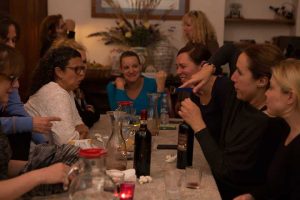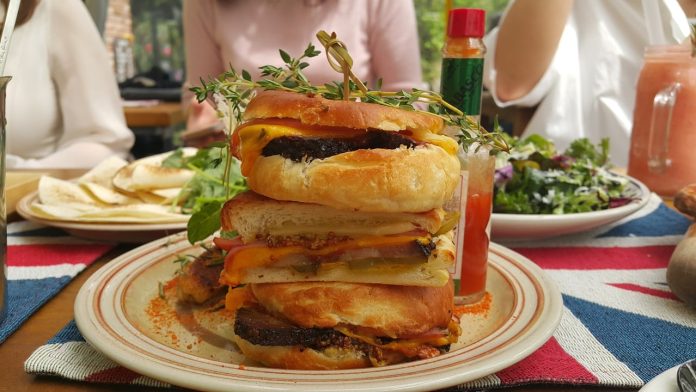By Katie Taylor
“I have AIDS,” she whispered, the tears that had dried on her face now mingling with fresh ones as her eyes focused somewhere in between my face and my feet. My arms felt heavy at my sides, and I was uncomfortably aware of the teenage boy behind the sandwich counter watching us.
I reached my arm forward, and she looked up at me. “What’s your name?” I asked.
“Robin,” she said. Before I could say anything else, she grasped my hand tightly in both of hers. “I need money. For my medicine. It’s so hard here. I was in New York, and I thought it would be easier here, but it’s hard here. It’s so hard here. I need the money. I need the money for my medicine, and the shelter’s going to close and – ”
She was talking faster and faster, her voice getting louder with every word, and I didn’t want the restaurant’s manager coming out again. I squeezed her hand, and she stopped talking.
I told her I’d give her what was left from buying our sandwiches. It was all the cash I had in my bag, I told her.
* * *
I’d passed her on my way to a 12-step meeting. That November, in the middle of an imploding marriage and deep in the battle with an eating disorder, I spent several nights a week in community centers and the basements of churches. In simple rooms with a circle of chairs and a rack of pamphlets about how to stop – stop drinking or drugging or eating or sexing or not eating or whatever it was that you couldn’t quit doing.
I had admitted that I was powerless, that my life had become unmanageable. I’d gotten a sponsor, sat across from her at a coffee shop and strategized about how I could release myself from the grip of compulsive overeating, the third station on my journey from anorexia and then bulimia. I had stopped the purging, but the binging would not let go. I was afraid of myself, of the way I would hide in the pantry of my kitchen at night and sob while shoving fistfuls of cereal or cheese or almonds or frozen waffles or whatever was in my hands into my mouth. I was afraid of where this was going, of how I felt like an intruder in my own skin, of the emptiness.
The Wednesday night meeting was at 6:00, an hour after closing at the office where I worked. Since the meeting was close by, I was left with the dangerous situation of half an hour to kill and nowhere warm to be that wasn’t serving food. I’d stopped into two different coffee shops and walked out the door again, the war in my head violent and exhausting. I knew I didn’t need the food, that I was still full from a snack at the office, that I would eat when I got home regardless of what I ate right then.
Turning down the street for my meeting, I watched a man and woman out of the corner of my eye and pulled my coat tighter around me. He was down on his knees, his clothing torn and stained, his hands on her hips. I couldn’t make out the words of his slurred speech. There was something desperate and menacing about him. Her body was rigid, her words sharp with anger. I slowed slightly, wondering for a moment if I should help. Then I stepped into the sandwich shop on the corner.
I breathed in the smell of fresh bread as I loitered near the door. There was no use convincing myself otherwise. I knew what was happening. I was going to sit there in silence and eat a sandwich and a bag of chips and drink a huge soda and then spend an hour wringing my hands in a pool of self-hatred in a room full of other people trying to get out from under food.
The woman from the street walked in, muttering to herself, as I began to order. She sat down at a table right by the counter and continued her quiet, angry chatter. The teenager making my sandwich watched the woman and then looked up at me awkwardly, a question in his eyes.
“Ma’am?” He leaned over the counter toward her. The woman raised her head, tears streaming down her face. She was living in a shelter, she said, and she needed food.
The manager, a man in his early twenties, about my age, came out from the back kitchen and narrowed his eyes at the scene – an empty restaurant except for me and a crying, disheveled woman in tattered clothes. He took a breath in, and I knew he was about to tell her to leave.
I fingered the twenty-dollar bill in my pocket. “Could I order a second sandwich, please?” I asked quickly. I turned to the woman from the street. “Go ahead. Get whatever you’d like,” I said as I motioned to the counter. The manager looked at me angrily but remained silent as he walked back into the kitchen.
She stared at the rows of meat and vegetables and looked at me anxiously. “I’m pregnant,” she told me. “I can’t have salt.” I wasn’t sure what to say or what she meant – no salt for pregnant women? It wasn’t something I’d ever heard of, but what did I know? She kept looking at me, and I turned to the teenage boy and met his gaze, as confused as mine. I told him to make a sandwich with the least salty thing, a question more than a statement. He shrugged and threw a few pieces of meat on the bread.
The woman’s tears had not stopped. I gave her a napkin as I said something incoherent. She motioned for me to come closer and whispered in my ear, “I have AIDS.”
* * *
I poured us both fountain drinks, and we sat down across from each other at a small table. I wracked my brain for what I might talk about, but she looked down at her sandwich and began muttering again, angry words that I couldn’t understand but that got louder and louder. I didn’t know whether to try to comfort her or leave her alone, but before I could do one or the other, she picked up her sandwich and her drink and walked out of the restaurant.
I stopped eating and sat still at my table wondering what had just happened, feeling a growing despair. And shame. Shame that I was here in this restaurant eating this sandwich that I didn’t need. Shame that I had so much and couldn’t do something as simple as eat just what my body needed and no more or less. Shame that I had hesitated before touching her on the arm, that I was wondering if she was honest about why she needed cash. Shame that I wanted her – this pregnant homeless woman without food or money – to sit across from me and eat a sandwich and make me feel better about myself.
I drank my soda and ate my meal, the bread and the meat thick and tasteless in my mouth. As I walked to the door, a voice called out to me.
“Miss.”
I hadn’t noticed the old man, worn and slumped over, sitting at a table in the corner. I put my hands up defensively, my lips ready to form the words I don’t have any… I was tired and ashamed and too involved in my own self-flagellation to care for another human being.
I didn’t have an opportunity to speak. He looked at me and said, “God will bless you for your kindness.”
My eyes filled and my chin quivered as I whispered Thank you. I wanted to tell him that he was wrong – that I was selfish and broken. But I didn’t. I needed his words too badly.
* * *
“My name is Katie, and I have an eating disorder.”
“Hi Katie,” they answered.
I stared at the floor, all words having left my head the moment I said my name. I breathed.
“I just ate dinner,” I told them. “And I’m going to eat again when I get home. I want to say that I’m not, but I know that I am because I can’t seem to get full. Ever.”
“I don’t know the way out, and I’m so tired of being this person. I’m so tired of thinking all the time, endlessly, about myself.”
I saw a few heads nodding in the room, and I felt tears on my cheeks. “Anyway,” I wiped my eyes and thought of Robin and the man in the corner. “I want to be better.”
The room held the silence of a dozen people waiting for one of their own to keep talking or crying or breathing. I shrugged.
“Thank you for sharing,” they said.
When I left the meeting, the man in the sandwich shop was gone.
I pray for Robin still.


